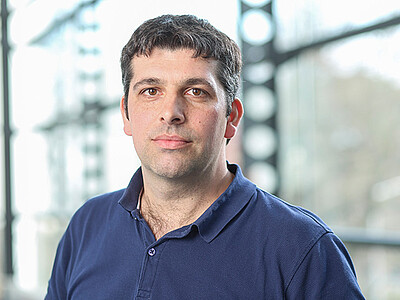Prof. Dr. Marcus Strand

Leiter Studiengang Informatik
Leiter des Robot-and-Human-Motion-Labs
Erzbergerstraße 121, Raum C551
- Telefon:
- +49.721.9735-924
- E-Mail:
- marcus.strand@dhbw-karlsruhe.de
Ausbildung
|
1996 ‑ 2002 |
Studium der Elektrotechnik und Informationstechnik an der Universität Karlsruhe |
|
1998 ‑ 2002 |
Begleitstudium „Angewandte Kulturwissenschaft“ an der Universität Karlsruhe |
|
2002 ‑ 2008 |
Wissenschaftlicher Mitarbeiter am Institut für Technische Informatik (ITEC) der Universität Karlsruhe Forschungs- und Entwicklungsarbeit an automatisierter Datenaufnahme durch 3D-Sensoren, Verfahren zur 2D/3D-Bildverarbeitung, Autonomer Navigation von mobilen Robotern, Trajektorienplanung für autonome Robotersysteme |
|
Mai 2008 |
Promotion zum Dr.-Ing. an der Fakultät für Informatik der Universität Karlsruhe mit dem Thema „Autonome 3D-Umweltmodellierung von Innenräumen auf Basis von dichten Tiefenbildern“ |
Berufliche Tätigkeit
|
2008 ‑ 2009 |
Angestellter am FZI Forschungszentrum Informatik im Bereich „Intelligent Systems and Production Engineering“ (ISPE), Abteilung „Interaktive Diagnose und Servicesysteme“ (IDS). Arbeitsschwerpunkt im Bereich Lokalisierung, Navigation und mobiler Robotik |
|
2009 ‑ 2012 |
Abteilungsleiter der Abteilung „Technisch Kognitive Assistenzsysteme“ (TKS) im Bereich ISPE am FZI Forschungszentrum Informatik |
|
2012 ‑ 2014 |
Bereichsleiter des Forschungsbereichs „Intelligent Systems and Production Engineering“ (ISPE) am FZI Forschungszentrum Informatik |
|
2014 ‑ heute |
Professor an der DHBW Karlsruhe, Fakultät Technik mit Schwerpunkt im Bereich intelligente Robotersysteme und Mensch-Maschine-Interaktion |
|
2017 ‑ heute |
Leiter des Robot-and-Human-Motion-Labs (RaHM-Lab, www.karlsruhe.dhbw.de/rahmlab/) |
|
2017 ‑ heute |
Studiengangsleiter Informatik |
Lehrgebiete
Intelligente Robotersysteme und Mensch-Maschine-Interaktion
Mitgliedschaften
- Mitglied des Gouverning Boards der „Intelligent Autonomous Systems Society (IAS)“. Nächste Konferenz IAS-2023 (https://ias-18.org/) in Suwon, Korea
- Workshop Chair der Konferenz IAS-13 Intelligent Autonomous Systems 2014“
- Financial Chair der Konferenz " IEEE 2016 International Conference on Multisensor Fusion and Integration for Intelligent Systems", 19.-21. September, Baden-Baden mfi2016.org/Main_Page
- Mitglied des Program Committees der Konferenz "Advanced Intelligent Mechatronics AIM 2016" www.aim2016.net
- Mitglied des Program Committees der Konferenz "Advanced Intelligent Mechatronics AIM 2017" https://www.ieee-ras.org/component/rseventspro/event/948-aim-2017-ieee-international-conference-on-advanced-intelligent-mechatronics
- General Chair der Konferenz „IAS-15 Intelligent Autonomous Systems“, Baden-Baden, Germany, 11.-15.6.2018“
- Financial Chair der Konferenz " IEEE 2020 International Conference on Multisensor Fusion and Integration for Intelligent Systems (MFI 2020)", Karlsruhe, September 2020, https://mfi2020.org/
- Tutorials Chair der Konferenz „IAS-17 Intelligent Autonomous Systems 2022“, Zagreb, Kroatien
Veröffentlichungen
-
(2019) : Classification of 3D structures based on an object detection for facade elements in multiple views during the reconstruction process In: IEEE: Proceedings of the IEEE Conference on Multisensor Fusion and Integration (MFI) 2019: 2019 IEEE International Conference on Industrial Cyber Physical Systems (ICPS 2019)): Taipeh, Taiwan: 6 – 9 May 2019. Institute of Electrical and Electronics Engineers, Inc.
-
(2018) : Towards a Stair Climbing Robot System Based on a Re-configurable Linkage Mechanism. Proceedings of the 15th International Conference IAS-15 In: Strand, Marcus; Dillmann, Rüdiger; Menegatti, Emanuele; Ghidoni, Stefano (Hg.): Intelligent Autonomous Systems 15: Proceedings of the 15th International Conference IAS-15: Springer International Publishing (Advances in Intelligent Systems and Computing), S. 278-288
-
(2010) : Continuous Evaluation of Methods for Sensor Data Fusion of Video-Based Driver Assistance Systems Using Virtual Road Tests: 10th International Symposium on Advanced Vehicle Control (AVEC): AVEC 2010 : 10th International Symposium on Advanced Vehicle Control: Loughborough, UK: Aug 22, 2010 - Aug 25, 2010. Loughborough University
-
(2007): The Elastic View Graph Framework for Autonomous, Surface-based 3D-SLAM Part I: Concept and Local Layer (Schritthaltendes flächenbasiertes 3D-SLAM mit elastisch gekoppelten Teilkarten). In: at – Automatisierungstechnik 55 (3). DOI: 10.1524/auto.2007.55.3.136
-
(2007): The Elastic View Graph Framework for Autonomous, Surface-based 3D-SLAM Part II: Global Layer and Experiments (Schritthaltendes flächenbasiertes 3D-SLAM mit elastisch gekoppelten Teilkarten). In: at – Automatisierungstechnik 55 (4). DOI: 10.1524/auto.2007.55.4.190
-
(2018) : Simulation and Transfer of Reinforcement Learning Algorithms for Autonomous Obstacle Avoidance In: Strand, Marcus; Dillmann, Rüdiger; Menegatti, Emanuele; Ghidoni, Stefano (Hg.): Proceedings of the 15th International Conference IAS-15: 15th International Conference on Intelligent Autonomous Systems IAS-15: Baden-Baden, Germany: Cham: Springer (Advances in Intelligent Systems and Computing)
-
(2021) : Fusion Of Radar- And Lidar-Data For Object-Tracking-Applications At Feature Level In: IAS Society: Proceedings of the 16th International Conference on Intelligent Autonomous Systems IAS-16: 16th International Conference on Intelligent Autonomous Systems IAS-16: Singapore: 22-25 June 2021. National University of Singapore
-
(2023) : Artificial Neural Network Guided Compensation of Nonlinear Payload and Wear Effects for Industrial Robots In: Xu, Xun; Vogel-Heuser, Birgit; Lu, Yuqian (Hg.): Editorial Proceedings of 2023 IEEE 19th International Conference on Automation Science and Engineering (CASE): Automation for a Resilient Society: 2023 IEEE 19th International Conference on Automation Science and Engineering (CASE): Auckland, New Zealand: 26-30 August 2023. IEEE, S. 1-8. Online verfügbar unter https://ieeexplore.ieee.org/document/10260559
-
(2018) : Which deep artificial neural network architecture to use for anomaly detection in Mobile Robots kinematic data? In: ML4CPS – Machine Learning for Cyber Physical Systems and Industry 4.0: Proceedings of the Conference Machine Learning for Cyber Physical Systems and Industry 4.0 ML4CPS Fraunhofer IOSB: 5th Conference on Machine Learning for Cyber Physical Systems: Karlsruhe: 2018. ML4CPS – Machine Learning for Cyber Physical Systems and Industry 4.0
-
(2018) : Unsupervised Hump Detection for Mobile Robots Based on Kinematic Measurements and Deep-Learning Based Autoencoder In: Strand, Marcus; Dillmann, Rüdiger; Menegatti, Emanuele; Ghidoni, Stefano (Hg.): Proceedings of the 15th International Conference IAS-15: 15th International Conference on Intelligent Autonomous Systems IAS-15: Baden-Baden, Germany: Cham: Springer (Advances in Intelligent Systems and Computing)
-
(2021) : A marker based optical measurement procedure to analyse robot arm movements and its application to improve accuracy of industrial robots In: IAS Society: Proceedings of the 16th International Conference on Intelligent Autonomous Systems IAS-16: 16th International Conference on Intelligent Autonomous Systems IAS-16: Singapore: 22-25 June 2021. National University of Singapore
-
(2023) : Application of Conformal Geometric Algebra in Robotics: DH-Parameters Extraction from Joint Axes Poses In: IAS Society: Proceedings of the 18th International Conference on Intelligent Autonomous Systems IAS-18: 18th International Conference on Intelligent Autonomous Systems IAS-18: Suwon, Korea: July 4 – 7, 2023. Korea Institute of Robotics and Technology Convergence
-
(2021) : Determination of posture comfort zones for robot-human handover tasks In: IAS Society: Proceedings of the 16th International Conference on Intelligent Autonomous Systems IAS-16: 16th International Conference on Intelligent Autonomous Systems IAS-16: Singapore: 22-25 June 2021. National University of Singapore
-
(2022) : Kinematic calibration of a collaborative robot by a marker based optical measurement procedure In: IAS Society: Proceedings of the 17th International Conference on Intelligent Autonomous Systems IAS-17: 17th International Conference on Intelligent Autonomous Systems IAS-17: Zagreb, Croatia: June 13-16, 2022. University of Zagreb Faculty of Electrical Engineering and Computing
-
(2017) : I Believe I Can Fly—Gesture-Driven Quadrotor Control Based on a Fuzzy Control System In: Chen, Weidong; Hosoda, Koh; Menegatti, Emanuele; Shimizu, Masahiro; Wang, Hesheng (Hg.): Intelligent Autonomous Systems 14: Proceedings of the 14th International Conference IAS-14, 531: Cham: Springer International Publishing (Advances in Intelligent Systems and Computing), S. 177-184
-
(2012) : Autonomous Navigation of a Personal Transporter within Moving Human Groups using Reactive Control In: Lee, Sukhan; Cho, Hyungsuck; Yoon, Kwang-Joon; Lee, Jangmyung (Hg.): 12th International Conference on Intelligent Autonomous Systems IAS-12: Jeju Island, Korea: Berlin; Heidelberg: Springer-Verlag (Advances in Intelligent Systems and Computing)
-
(2023) : Autonomous Surface Grinding of wind turbine blades In: IAS Society: Proceedings of the 18th International Conference on Intelligent Autonomous Systems IAS-18: 18th International Conference on Intelligent Autonomous Systems IAS-18: Suwon, Korea: July 4 – 7, 2023. Korea Institute of Robotics and Technology Convergence
-
(2008) : Using an attributed 2D-grid for next-best-view planning on 3D environment data for an autonomous robot In: IEEE: Proceedings of International Conference on Information and Automation (ICIA): International Conference on Information and Automation (ICIA): Zhangjiajie, China
-
Strand, Marcus; Dillmann, Rüdiger; Menegatti, Emanuele; Ghidoni, Stefano (Hg.) (2018): Proceedings of the 15th International Conference IAS-15. 15th International Conference on Intelligent Autonomous Systems IAS-15. Baden-Baden, Germany. Cham: Springer (Advances in Intelligent Systems and Computing). Online verfügbar unter www.ias-15.org
-
(2009) : Approximation and Segmentation of Objects in Pointclouds using Superquadrics In: IEEE: Proceedings of International Conference on Information and Automation (ICIA): International Conference on Information and Automation (ICIA): Zhuhai, China
-
(2009) : Control of an autonomous personal transporter towards moving targets In: IEEE: Proceedings of IEEE Workshop on Advanced Robotics and its Social Impacts, ARSO: IEEE Workshop on Advanced Robotics and its Social Impacts, ARSO2009: Tokyo, Japan: November 23-25, 2009
-
(2011) : Entwurf eines translatorischen und rotatorischen Fahrreglers für autonome einachsige Personentransporter In: VDE/VDI-Gesellschaft Mikroelektronik, Mikro- und Feinwerktechnik -GMM-; Informationstechnische Gesellschaft Gesellschaft für Informatik, Bonn (Hg.): Workshop Cyber Physical Systems – Enabling Multi-Nature Systems (CPMNS): Workshop Cyber-Physical Systems - Enabling Multi-Nature Systems (CPMNS: Bremen, Germany: 23. - 24. Februar 2011
-
(2023) : Autonomous Model-Based Inspection Planning for 3D Visual Coverage In: IAS Society: Proceedings of the 18th International Conference on Intelligent Autonomous Systems IAS-18: 18th International Conference on Intelligent Autonomous Systems IAS-18: Suwon, Korea: July 4 – 7, 2023. Korea Institute of Robotics and Technology Convergence
-
(2021) : Learning and Transfer of movement gaits using reinforcement learning In: CLAWAR Association: CLAWAR 2021 conference proceedings: 24rd International Conference on Climbing and Walking Robots and the support Technologies for Mobile Machines (CLAWAR 2021): Takarazuka, Japan: 30 Aug - 1 Sep 2021. CLAWAR Association, Kwansei Gakuin University (KGU), Takarazuka, Japan: Springer (AISC Springer Series)
-
(2004) : 3D Global and Mobile Sensor Data Fusion for Mobile Platform Navigation In: IEEE: International Conference on Robotics and Automation (ICRA): 2004 IEEE International Conference on Robotics and Automation - IEEE ICRA -2004: New Orleans, USA: 26 April-1 May 2004
-
(2006) : A foveal 3D laser scanner integrating texture into range data In: Arai, Tamio; Pfeifer, Rolf; Balch, Tucker R.; Yokoi, Hiroshi (Hg.): Proceedings of the 9th International Conference on Intelligent Autonomous Systems: Intelligent Autonomous Systems 9 - IAS-9: Tokyo, Japan: March 7-9. University of Tokyo, S. 748-755
-
(2003) : A Robot Navigation Approach Based on 3D Data Fusion In: IEEE Robotics and Automation Society (RAS) and the IEEE Industrial Electronics Society: Proceedings of IEEE International Conference on Multisensor Fusion and Integration for Intelligent Systems, MFI2003.: International Conference on Multisensor Fusion and Integration for Intelligent Systems (MFI): Tokyo, Japan
-
(2004) : Sequential 3D-SLAM for mobile action planning In: IEEE: International Conference on Intelligent Robots and Systems (IROS): 2004 IEEE/RSJ International Conference on Intelligent Robots and Systems (IROS): Sendai, Japan: 28 Sept.-2 Oct. 2004
